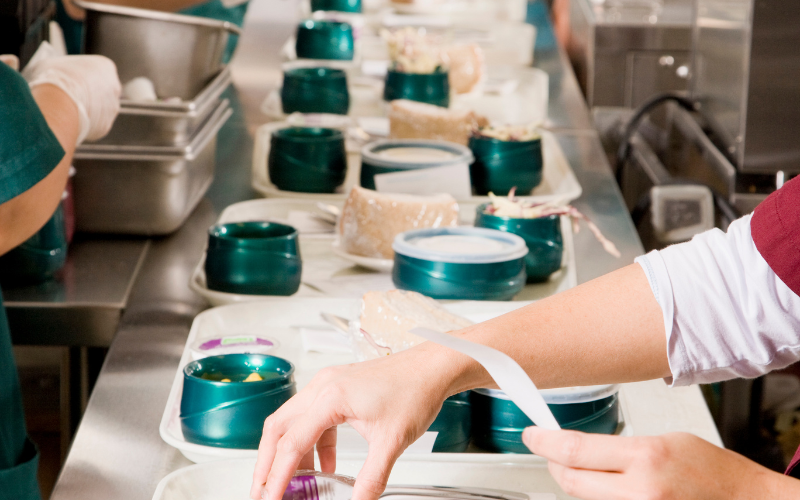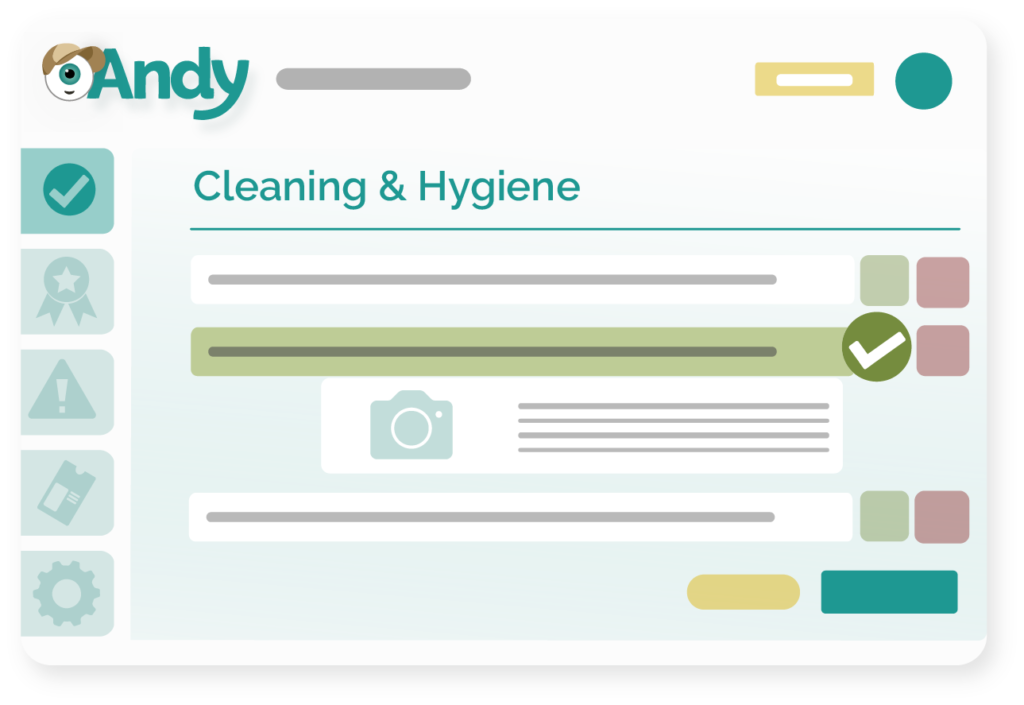Food Safety Audits in Hospitals: Ensuring patient wellbeing with Andy

Patient safety within hospital environments is an unequivocal priority, and it encompasses a multitude of aspects beyond medical procedures.
One often overlooked yet critical facet is the safety of the food served to patients.
Hospitalised individuals are particularly susceptible to foodborne illnesses due to their compromised immune systems, making robust food safety measures imperative.
The implementation of regular food safety audits emerges as a proactive strategy to safeguard patient well-being.
In this article, we’ll delve into the pivotal role of food safety audits in hospitals, underscoring the significance of maintaining high standards in food handling, preparation, and storage. We’ll explore the role of food safety audits, their benefits, their key elements, and the role our leading food safety digital assistant Andy plays in upholding patient safety and fostering a culture of continuous improvement within healthcare institutions.
The Role of Food Safety in Hospitals
Beyond medical treatments, the provision of safe, untainted nourishment becomes a foundational pillar of patient well-being.
The imperative for stringent food safety practices arises from the heightened vulnerability of patients with compromised immune systems. Individuals battling illnesses and injuries face elevated risks from infections, including those stemming from compromised food handling.
A robust food safety framework not only fulfills regulatory requirements but also underscores an ethical obligation to ensure patients’ holistic well-being, extending to every culinary offering.
Risks of Inadequate Food Safety Measures
The ramifications of subpar food safety practices within hospitals can be profound.
Contaminated food holds the potential to trigger widespread illness among patients, exacerbating their medical conditions and augmenting the workload for healthcare providers.
Hospital-acquired infections, including those originating from foodborne pathogens, can elongate hospital stays, inflate treatment expenses, and even pose life-threatening implications.
Recognising Patient Vulnerability to Foodborne Illnesses
Within the hospital context, patients are not mere recipients of medical care; they constitute a fragile demographic with diminished immunity.
This susceptibility amplifies the repercussions of even minor lapses in food safety.
A seemingly innocuous oversight in food storage, preparation, or handling could yield severe consequences for individuals already grappling with health adversities.
Acknowledging this vulnerability underscores the urgency of establishing rigorous food safety protocols that brook no compromise.

Understanding Food Safety Audits in Hospitals
Food safety audits in hospitals are methodical evaluations conducted to scrutinise the entire spectrum of food-related practices within a hospital environment. Their primary purpose is to ensure that every step of the culinary journey, from procurement to plating, aligns with stringent safety guidelines.
By subjecting these processes to systematic scrutiny, audits act as sentinels guarding against potential hazards, reinforcing a culture of uncompromising patient safety.
Enforcing Compliance with Food Safety Standards
The overarching goal of food safety audits in hospitals is to establish that these adhere unfailingly to established food safety standards and regulations. This compliance extends beyond mere formality; it reflects a commitment to safeguarding patients’ health by mitigating risks associated with improper food handling, storage, and preparation.
Food safety audits in hospitals encompass a comprehensive assessment that embraces various facets of culinary operations. From the meticulous handling of ingredients to the meticulous hygiene practices of kitchen staff, audits examine the efficacy of food storage, ensuring optimal temperatures to deter the proliferation of pathogens.
Equally, audits delve into the preparation processes, focusing on the prevention of cross-contamination and upholding the integrity of each dish served.
Moreover, these evaluations underscore the significance of impeccable hygiene practices, reinforcing the idea that cleanliness in the kitchen translates directly to patients’ well-being.
Food safety audits in hospitals are not just inspections; they are orchestrated endeavors to infuse hospital kitchens with a culture of precision and responsibility.
Benefits of Regular Food Safety Audits in Hospitals
The merits of integrating regular food safety audits within hospital protocols are profound and quantifiable.
These audits yield tangible advantages that extend beyond the confines of the kitchen, encompassing patient well-being, financial considerations, and the overarching quality of healthcare delivery.
Enhancing Patient Safety
Regular food safety audits serve as a defense against potential health hazards for patients. By meticulously scrutinising every stage of food preparation, audits minimise the likelihood of contamination and subsequent foodborne illnesses.
Patients, especially those with compromised immune systems, are shielded from unnecessary health complications, ensuring that their hospital stay is marked by recovery rather than additional ailments.
Mitigating Foodborne Illness Risks and Healthcare Costs
One of the most palpable benefits of consistent food safety audits is the reduction in foodborne illness risks. These audits pinpoint vulnerabilities in food handling, storage, and preparation, enabling swift corrective action.
By minimising the occurrence of foodborne illnesses among patients, hospitals simultaneously curtail the need for additional medical interventions, thus alleviating healthcare costs associated with treating preventable conditions.
Cultivating Accountability and Continuous Improvement
Regular food safety audits foster an environment of accountability and perpetual refinement.
Knowing that their practices are subject to systematic evaluation, kitchen staff are incentivized to adhere meticulously to food safety protocols. This not only minimises the potential for lapses but also cultivates a culture of continuous improvement.
Audits serve as diagnostic tools that identify areas for enhancement, prompting the implementation of corrective measures and ensuring that hospital culinary operations evolve in alignment with the latest best practices.

Key Elements of Food Safety Audits in Hospitals
Food safety audits are multifaceted evaluations that encompass a spectrum of critical components, each designed to fortify the integrity of food handling and preparation within hospital kitchens.
These elements function collectively to ensure that patients receive nourishment that is not only delicious but also safe and untainted.
Food Storage and Temperature Control
Central to food safety audits is the assessment of food storage practices.
Auditors meticulously examine whether ingredients are stored at appropriate temperatures, thereby deterring the proliferation of harmful microorganisms. This component underscores the significance of maintaining precise temperature controls to preserve the freshness and safety of culinary materials.
Proper Food Handling and Cross-Contamination Prevention
Audits meticulously scrutinise the protocols for food handling, emphasizing the significance of preventing cross-contamination. The proper segregation of raw and cooked foods, along with the use of separate utensils and surfaces, is emphasised.
These measures curtail the transfer of pathogens and allergens, safeguarding patients from potential health hazards.
Sanitisation and Hygiene Practices of your Kitchen Staff
The hygiene practices of kitchen staff are paramount in ensuring the safety of prepared meals. Food safety audits assess the adequacy of sanitation protocols, including handwashing, personal protective equipment usage, and overall cleanliness.
These measures are pivotal in preventing the introduction of harmful agents that could compromise patient well-being.
Training and Education of Kitchen Personnel
A well-informed kitchen team is fundamental to maintaining robust food safety practices. Audits evaluate the training and education programs in place for kitchen personnel.
Ensuring that staff members are equipped with the knowledge of proper food handling techniques, sanitation guidelines, and regulatory standards reinforces a culture of precision.
Monitoring and Record-keeping of Food Safety Protocols
Documentation and monitoring play an integral role in food safety audits. Evaluators inspect the extent to which kitchen operations are tracked and recorded, ensuring that a transparent and accountable record-keeping system is maintained. This process not only aids in traceability but also assists in identifying trends, enabling proactive adjustments and enhancements.
Implementing Food Safety Audits in Hospitals with Andy, your Digital Food Safety Assistant
Andy is a leading digital food safety software transforming the way food audits are implemented within hospital environments.
 With its robust features and intuitive design, Andy presents a groundbreaking solution to enhance food safety protocols and streamline auditing processes in hospitals.
With its robust features and intuitive design, Andy presents a groundbreaking solution to enhance food safety protocols and streamline auditing processes in hospitals.
Seamless Auditing Process
ndy simplifies the traditionally intricate process of food safety audits. Its user-friendly interface allows auditors to effortlessly navigate through various assessment categories, ensuring that no critical element is overlooked.
This seamless user experience minimises the time and resources required for manual audits, enabling hospital staff to focus more on patient care and less on administrative tasks.
Comprehensive Checklist Management
One of Andy’s standout features is its comprehensive checklist management system.
Andy comes preloaded with extensive checklists that cover every aspect of food safety, including storage, handling, preparation, and hygiene.
These standardised checklists ensure that auditors evaluate all necessary components, leaving no room for oversight.
Additionally, Andy allows hospitals to customise their checklists to align with their specific protocols and regulatory requirements.
Real-time Monitoring and Data Analytics
Andy’s real-time monitoring capabilities bring a new level of transparency to food safety audits.
Auditors can input their findings directly into the tool, which then compiles the data into insightful reports. Hospital administrators gain access to these reports in real time, enabling them to identify trends, areas of improvement, and potential concerns promptly.
This data-driven approach empowers hospitals to make informed decisions to enhance food safety protocols continually.
Proactive Alerts and Notifications
Andy’s proactive nature extends beyond audits.
The tool employs an intelligent alert system that notifies relevant personnel of impending audits, upcoming training sessions, and critical action items.
This feature helps keep hospital staff well-prepared and informed, fostering a culture of accountability and readiness for audits.
Training and Education Integration
Recognising the role of training and education in upholding food safety, Andy seamlessly integrates with training modules.
Hospitals can upload training materials and resources directly into the tool, ensuring that kitchen staff remain up to date with the latest best practices.
This integration helps in creating a well-informed team that operates cohesively toward maintaining the highest food safety standards.
By digitising and streamlining the auditing process, Andy optimises efficiency, accountability, and patient safety. Its intuitive design, real-time monitoring, and proactive features make it a valuable asset in the pursuit of uncompromising food safety within healthcare institutions.
Try Andy now and discover the many benefits of having this helpful Food Safety digital assistant in your kitchens!
👉🏽START 100% FREE HERE!👈🏽

